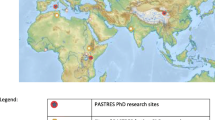
Overview
- Presents an integrated, interdisciplinary approach to how to best mitigate the COVID-19 crisis
- Examines goals and targets of societies for a sustainable future practice
- Discusses policy options and best practices for reducing economic and political shocks in Africa
Part of the book series: Advances in African Economic, Social and Political Development (AAESPD)
Access this book
Tax calculation will be finalised at checkout
Other ways to access
About this book
This book explores in detail how African countries dealt with the pandemic and how it affected different aspects of different economies and social structures. Observing how human beings change the environment and, specifically, how population growth and urbanization negatively impact nature, recently shocked economies and social upheaval in Africa indicate a crossroads moment for the continent. The book further adds to the knowledge base of how to build a more robust Africa with sustainable solutions working in tandem with vibrant and robust economies. Commonsense social strategies go hand in hand with trackable shocked economies via first- and second-moment reactions. Uncertainty shocks, in this case, interrelate via an umbrella effect. The authors evaluate theories of impact shocks using a sustainable growth and change model. Finally, key topics incorporate new urban thinking for economic recovery, developing sustainable economies post-COVID-19, understanding social practices during a crisis, and developing community robustness via shock events.
The book integrates an interdisciplinary approach to understanding how to best mitigate the COVID-19 crisis as well as reduce future shocks to the African continent. It raises vital questions connecting the effects of lockdown measures, crisis causation, and shock impacts most countries faced over the last two-year period. The answers to these questions are not limited to economists and sociologists, instead, they magnify to include policymakers and everyday people. The nature of this book is to help piece together solutions for preparedness, a stronger understanding of sound development, and a united and resilient Pan-Africanism to best handle future shock events.
Similar content being viewed by others
Keywords
- Covid-19
- Economic shocks
- Economic crisis
- Urban shocks
- Green city strategies
- Climate change
- Urbanization
- Housing
- Green buildings
- Societal shocks
- African macroeconomics
- African microeconomics
- Social development
- Shock management
- Developing economies
- Small-holder farmers
- Small and medium-sized enterprises
Table of contents (12 chapters)
-
Front Matter
-
Shocked Economies: New Urban Thinking and Sustainable Advancement
-
Front Matter
-
-
Shocked Social Development: Mechanisms to Improve Community Robustness
-
Front Matter
-
-
Back Matter
Editors and Affiliations
About the editor
Giuseppe T. Cirella, Professor of Human Geography, works at the Faculty of Economics, University of Gdansk, Sopot, Poland, where he received a Doctor of Habilitation (Dr. Hab.) in Economics and Finance. He specializes in economic development, environmental social science, and sustainability. His interdisciplinary background also includes socio-political research throughout Eastern Europe, Africa, and China. After completing a Doctor of Philosophy (Ph. D.) at Griffith University, Gold Coast, Australia, within the Centre for Infrastructure Engineering and Management, on developing a sustainability-based index, he founded the Polo Centre of Sustainability in Italy. Notably, he has held professorships and scientific positions at Saint Petersburg State University, Russia; Inner Mongolia University of Science and Technology, China; Life University, Cambodia; and Free University of Bozen, Italy. In his early career, he worked with the Canadian International Development Agency in Indonesia as well as with Radarsat International in Brazil. He is also on the editorial board of a number of internationally renowned academic peer-reviewed journals.
Bibliographic Information
Book Title: Uncertainty Shocks in Africa
Book Subtitle: Impact and Equilibrium Strategies for Sound Economic and Social Development
Editors: Giuseppe T. Cirella
Series Title: Advances in African Economic, Social and Political Development
DOI: https://doi.org/10.1007/978-3-031-21885-9
Publisher: Springer Cham
eBook Packages: Economics and Finance, Economics and Finance (R0)
Copyright Information: The Editor(s) (if applicable) and The Author(s), under exclusive license to Springer Nature Switzerland AG 2023
Hardcover ISBN: 978-3-031-21884-2Published: 04 February 2023
Softcover ISBN: 978-3-031-21887-3Published: 04 February 2024
eBook ISBN: 978-3-031-21885-9Published: 03 February 2023
Series ISSN: 2198-7262
Series E-ISSN: 2198-7270
Edition Number: 1
Number of Pages: XXII, 231
Number of Illustrations: 1 b/w illustrations
Topics: African Economics, Economic Growth, Development Economics, Development Studies, Globalization, Political Economy/Economic Systems



